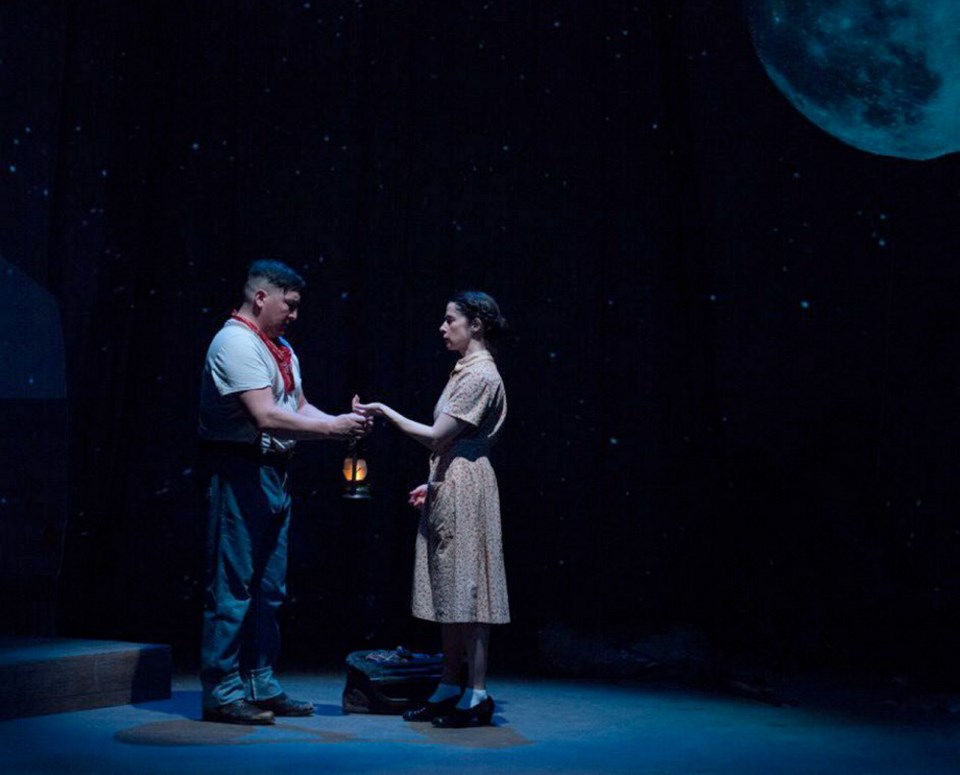ON STAGE
What: The Ministry of Grace
Where: The Belfry Theatre, 1291 Gladstone Ave.
When: To March 1
Tickets: $39 from the Belfry box office (250-385-6815) or tickets.belfry.bc.ca
The scars from the not-so-distant-past cut deep for members of First Nation communities across the country, many of which saw storytelling — a building block of Indigenous culture — eradicated by residential-school rules.
“My family is pretty quiet and reticent when it comes to disclosing anything,” said Toronto director and playwright Tara Beagan, who is of Nlaka’pamux and Irish-Canadian descent. “I’ve done 28 plays, so I’ve had to do a lot of digging around, asking my great aunties questions they consider so bizarre. I’m the storyteller in my family, for the most part.”
Beagan dug deep into her family history on both sides of the Rocky Mountains for The Ministry of Grace, which had its world première at the Belfry Theatre on Tuesday. Beagan, with ancestral roots in the Coldwater Indian Band, south of Merritt, and the Blackfoot region of Alberta, tapped into the life of her grandmother, Mary Collins, for The Ministry of Grace.
The play is based loosely on her grandmother’s time in California working for a travelling evangelical minister in 1950 — a part of her grandmother’s past Beagan did not learn about until several years ago.
“My mom will tell me things in little blips. We’ll see a movie or something, and she’ll say: ‘Oh, that reminds me of the time your grandma Mary went to California to work on a cotton plantation.’ And I’m like: ‘Pardon me? This is the first time I’m hearing this?’ ”
Beagan’s grandmother, an Indigenous healer from Merritt, lives in the character of Mary Collins, who is played by PJ Prudat in her Belfry debut. The axis around which everything in The Ministry of Grace revolves, Mary is soon renamed Grace when she meets an evangelist named Brother Cain (Stafford Perry, also making his Belfry debut), who was turned away from the seminary as a Catholic student for shady dealings.
He sees dollar signs in what the woman can bring to his tent revival shows, and employs her to read passages from the Bible on stage, referring to her as the Tamed Heathen, because she can read.
The story unfolds on stage between a 1942 Ford pickup and two travel trailers, part of the tent revival’s backstage area that doubles as Grace’s sleeping quarters.
“Because the other women who travel with the show don’t want to sleep with her in the same area, she’s set up in the back of the gear truck,” Beagan said. “She’s by herself in the California night, and creates her own home away from home. It’s a viewpoint many have never seen before. You can see old footage of evangelical ministers, but you rarely see the backstage area. That’s where we take the audience.”
Grace develops a friendship with Clem (Sheldon Elter), a Cree stagehand who is part of the pitching crew responsible for erecting Brother Cain’s canvas tents, which are as big as football fields.
The play’s connection to her grandmother veers into fiction in spots, but it is known that members of Indigenous communities in Canada often found work in California during that time, Beagan said. There was often a shortage of labourers during harvest season in California following the Second World War, and workers were recruited up the West Coast and into the Interior.
Beagan set The Ministry of Grace in 1950, the same year young members of Beagan’s family were taken into residential schools in Canada. “When that call for labourers came in the fall, my grandmother couldn’t stand being at home without her kids, so she went south.”
She learned that her grandmother briefly worked on a cotton plantation, and was recruited by an evangelist shortly thereafter. When other details weren’t forthcoming, she was given permission by her family to fill in some fictional blanks.
“There are very few facts known about my grandmother’s time in California,” Beagan said, attributing her grandmother’s reticence to residential-school teachings that forbade students and families from talking about their pasts.
The Ministry of Grace is clearly a labour of love for Beagan. It took 10 years and 17 drafts to get to the finished stage, following workshops at Toronto’s Native Earth Performing Arts (where she was artistic director from 2011 to 2013), Ottawa’s National Arts Centre (where she was playwright-in-residence) and Playwrights’ Workshop Montreal.
The play bounced between the frontburner and backburner several times, until Beagan settled on the all-Indigenous team, which includes set and lighting designer Andy Moro and costume designer Jeff Chief, that brought the production to the Belfry.
“Five years ago, I wouldn’t have thought I was the director for this. But I am certain of that now. In a way, the play has grown with my capabilities. These plays kind of arrive almost whole, and then I need to just sit down and type it out. The rest of it is doing the math.”



